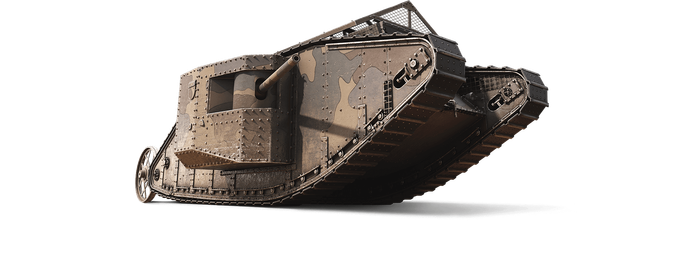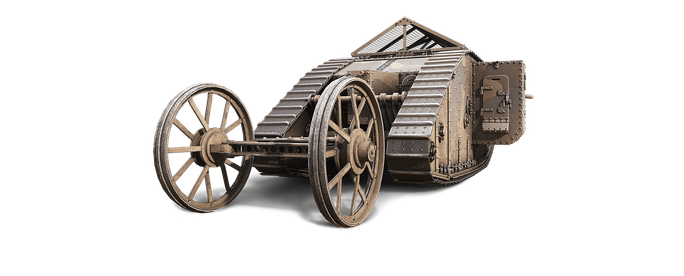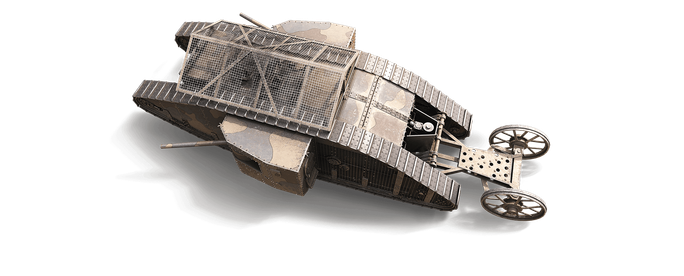On September 15, 1916, the very first tank in history–the British Mark I–made its explosive battlefield debut in the Battle of the Somme, opening up a whole new world to us: a world of tanks. Read this article to find out how the development of this legendary vehicle shaped combat history and battlefield tactics in World War I!
Why was the introduction of the Mark I tank to World War I in 1916 so important?
 The British Mark I tank
The British Mark I tank
The war on the Western Front was at a virtual stalemate. Trench warfare was characterised by sudden offensives; one side tried to break through the other’s lines with massive artillery bombardments, followed by tens of thousands of men attacking via no-man’s land. The cost of these advances in human lives was vast. Machine guns would cut down man after man from hundreds of yards away, and all this while advancing on a dug-in and well-protected enemy.
A handful of inventors and visionary engineers all arrived at the same idea–build some kind of armed and armored vehicle that could create gaps in the barbed wire, knock out machine gun posts and bunkers, and protect infantry long enough for the trench networks to be captured. A vehicle that could ultimately, and oddly, ‘save lives’.
What was the legacy of the Mark I’s design on later tanks?
 The British Mark IV tank
The British Mark IV tank
The Mark I certainly had its limitations. Their slow speed made them easy targets for artillery, and while they were armed with machine guns and cannons (depending on whether it was a ‘male’ or a ‘female’), these were arranged on their sides, meaning the whole vehicle had to be moved to bring them to bear on the enemy. What’s more, crew comfort was nonexistent: the Mark I tanks were dark, noisy, incredibly hot, and full of engine fumes.
However, the British saw the potential of this basic design and constantly updated it. An improved version, the Mark IV, came into service in 1917. Ultimately, these machines were the ‘loose blueprint’ for the tank to come in the future: not only in terms of design, but also the change in tactical doctrine.
How did the introduction of the Mark I change battlefield tactics in WWI?
 Military technology of the time favoured the defense. Even if an attack did succeed, it was almost impossible to exploit the breach before the enemy rushed in reinforcements to stabilise the front.
Military technology of the time favoured the defense. Even if an attack did succeed, it was almost impossible to exploit the breach before the enemy rushed in reinforcements to stabilise the front.
The first 50 tanks were sent to France in August 1916 to join the British push that summer along the River Somme. They were thrown into the attack on 15 September with little preparation, and almost half of them broke down before coming into contact with the enemy. They managed to advance a couple of miles through two of the three German lines, inflicting heavy casualties, but lack of communication (they had no radios) and lack of coordination with infantry and artillery stalled the attack.
Hard lessons were learnt that became the basis of armoured warfare doctrine going forward.
What lengths does Wargaming go to for authenticity and accuracy in its recreations of these incredible machines?
 First, the design team, along with the historical consultants and a multitude of other people, begins work on preparing the potential vehicles. Then the next stage is documentation. This involves archives, blueprints, sketches, military photographs, news reels, and 3D scans where possible.
First, the design team, along with the historical consultants and a multitude of other people, begins work on preparing the potential vehicles. Then the next stage is documentation. This involves archives, blueprints, sketches, military photographs, news reels, and 3D scans where possible.
 We then get designers to build what we call a ‘historical description’. We detail tactical and technical characteristics all about the weaponry, including the elevation and depression angles, and armor thickness is obviously incredibly important. We also get data on maximum speeds, but not just maximum speeds as you would find on a source like Wikipedia. They’re the maximum speeds on various terrains.
We then get designers to build what we call a ‘historical description’. We detail tactical and technical characteristics all about the weaponry, including the elevation and depression angles, and armor thickness is obviously incredibly important. We also get data on maximum speeds, but not just maximum speeds as you would find on a source like Wikipedia. They’re the maximum speeds on various terrains.
 Only after all that provisional work is done do we then move onto the next stage, which is the ‘tech tree’ stage. Then it gets a bit more game-orientated. Balance is, of course, a challenge because we are talking about a game that has tanks which very possibly never fought against each other on the battlefield. So to make sure that nothing is overpowered, or alternatively underwhelming, we test heavily to ensure its playability.
Only after all that provisional work is done do we then move onto the next stage, which is the ‘tech tree’ stage. Then it gets a bit more game-orientated. Balance is, of course, a challenge because we are talking about a game that has tanks which very possibly never fought against each other on the battlefield. So to make sure that nothing is overpowered, or alternatively underwhelming, we test heavily to ensure its playability.
This process can vary wildly in terms of how long it takes. The easiest tanks might be able to be completed and dropped into the game in as few as four weeks, or it could take upwards of six months if the details on the tank are scarce.
To assist in its research, Wargaming maintains partnerships with tank museums across the globe, and this process involves the multiple teams across the organisation, from the dedicated researchers that Wargaming keeps on staff right through to the programmers and testers.
What can players look forward to learning about tank mechanics and tactics from playing World Of Tanks?
The peculiarities of each vehicle: what is good or less so in its abilities, from firepower to protection to mobility. In terms of playing, the value of preparation and knowing the terrain–as with real tank warfare, the use of terrain is critical both in terms of movement and the selection of fire positions. In addition, teamwork and the basics of communication are key to winning on the virtual battlefield.
The level of detail that Wargaming goes into, working closely with tank museums globally, means that you couldn’t ask for a more realistic recreation of some of the most famous battleground machines. It’s the greatest virtual tank museum in the world.
If you’re interested in tanks and the complex tactical warfare that they engage in, then World of Tanks is an amazing way to experience these incredible machines for yourself from the comfort of your PC.
About the Expert: Richard Cutland
A 30-year veteran of the British Army Royal Tank Regiment, Richard Cutland is Head of European Military Relations for Wargaming.net and the host of the Tank Nuts podcast.
This article originally appeared on HistoryAnswers.co.uk.
 Richard "The Challenger" Cutland
Richard "The Challenger" Cutland